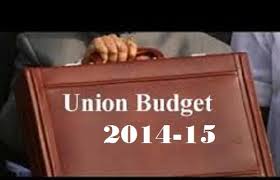Glimpses of the Union budget 2014 -15
 The Union Budget, presented by the Union finance minister Arun Jaitley on 10.7.2014, tends to offer diverse impact on different industries. The announcements made in the Budget can have both positive as well as negative impact on many sectors.
The Union Budget, presented by the Union finance minister Arun Jaitley on 10.7.2014, tends to offer diverse impact on different industries. The announcements made in the Budget can have both positive as well as negative impact on many sectors.
The new announcements made in the Budget, made people to hope that the new government will re –build the country as an economic force and will give confidence to the investors that will promote growth in all the sectors.
The new Union Budget aims to promote economic reforms, provide rational taxation and to enhance positive policy steps.
The new announcements show a positive approach to policies for taxation and expenses of the government to promote economic growth. Real estate and Financial sectors are the greatest beneficiaries.
1. The impact on Real Estate: The housing and real estate market is going to be benefitted from the budget. The budget announced some important measures like development of 100 cities, foreign investment in low-expenses housing, tax relaxations to be applied to the Real Estate Investment Trusts, new allocation for the National Housing Bank, development of slum areas as a corporate social responsibility. These are likely to affect the real estate and construction market to a great extent. The introduction of higher tax-exemption on interest towards home loan would definitely help to increase demand for houses. These measures have been affected by low demand and high expenses.
2. The impact on Financial Sector: Banks, particularly public-sector banks are the second-highest beneficiary in the new Budget after real estate. The budget has provided banks to increase their capital by selling government stake. The foreign direct investment limit in the insurance sector has been increased up to 49%. Banks have also been permitted to raise long-term funds for lending to the infrastructure sector with flexible obligations. This will help banks to gather funds easily for infrastructure projects and their financial burden will be reduced. An increase in tax exemptions on investments would help funds to flow to the financial sector by means of increased savings.
3. The impact on Petroleum & Natural Gas: As per the policies of the new Budget, the production and utility of Coal Bed Methane reserves are going to develop. Modern technology is going to be applied to revive sealed wells. It has been proposed to develop pipelines by using PPP models. The city gas distribution companies are going to be benefitted.
4. The impact on Auto Industry: The finance minister had already proposed excise duty relaxation to the auto sector in the new budget. The measures such as investment allowance to the small and medium enterprises, lowering the basic custom duty on scraps and lowering the excise duty on raw materials are going to affect auto companies. The Budget aims to concentrate also on improving agriculture for the auto sector as it will accelerate rural income, which could result in an increase in the demand for cars as well as two-wheelers.
5. The impact on Information Technology industry: The government is going to provide funds for start-ups and entrepreneurs. It has also declared to concentrate on improving technology. The Finance Minister has said that the Government will spend Rs 500 crores for establishing IITs. This will help the sector as it will increase the usage of technology providing more business to companies in India.
6. The impact on Power industry: The Finance Minister has proposed to cut down customs duty on some wind power equipments. An extension on 80IA policies shall be given till March, 2017. It has been proposed to arrange funds for modern solar power projects. Moreover adequate coal shall be given to existing power plants and power shall be supplied to households all round the clock.
7. The impact on Metals & Mining sector: As per the new budget, the export duty on bauxite shall be increased from 10% to 20%. This is an advantage for the aluminum manufacturing companies. There is also going to be an increase in the basic customs duty on imported products of stainless steel from 5% to more than 7% and a reduction in basic customs duty on forged steel rings required in the manufacture of bearings of air operated electrical generators from 10% to 5%. The increase in export duty will retard bauxite exports and will improve raw material availability for Indian companies. The availability of coal will reduce the cost and is likely to improve capacity utilization.


 ITAT Amritsar: No Section 269SS Violation for One-Time Cash Payment Before Sub-Registrar
ITAT Amritsar: No Section 269SS Violation for One-Time Cash Payment Before Sub-Registrar  Tax Officials Unleash Digital Dragnet: How New Raid Powers Redefine Privacy, Property Rights in India and likely to Fuel Corruption
Tax Officials Unleash Digital Dragnet: How New Raid Powers Redefine Privacy, Property Rights in India and likely to Fuel Corruption  Income Tax Department Rewards for Reporting Tax Evasion: A Comprehensive Guide
Income Tax Department Rewards for Reporting Tax Evasion: A Comprehensive Guide  Forfeiture of Gratuity by Employer- What are the Remedies for an employee- Can employer be challenged?
Forfeiture of Gratuity by Employer- What are the Remedies for an employee- Can employer be challenged?  Employer can forfeit gratuity of an employee in case of moral turpitude
Employer can forfeit gratuity of an employee in case of moral turpitude  Diving Deeper: The Impact of the New Tax Bill on Dairy and Farming Income
Diving Deeper: The Impact of the New Tax Bill on Dairy and Farming Income